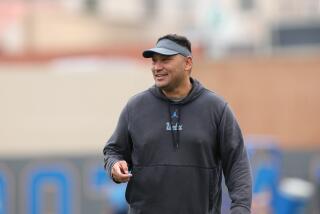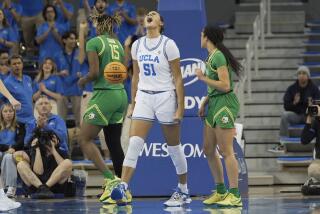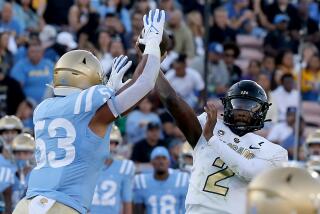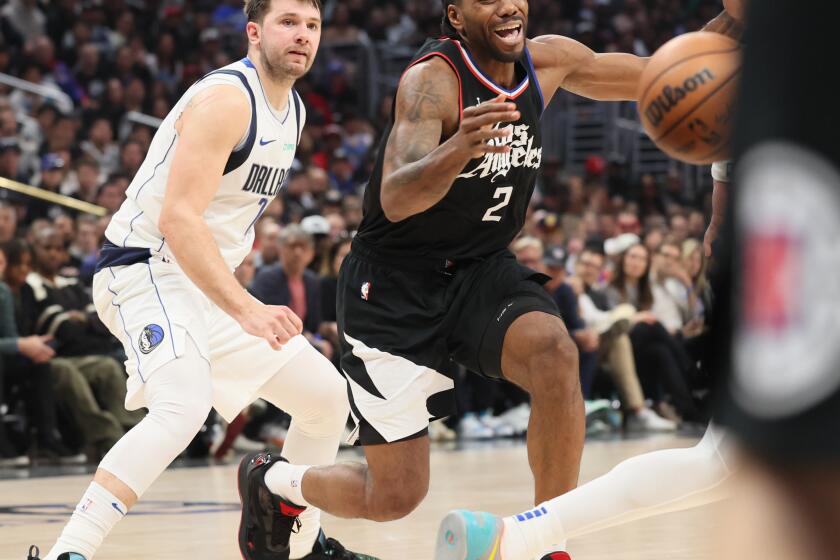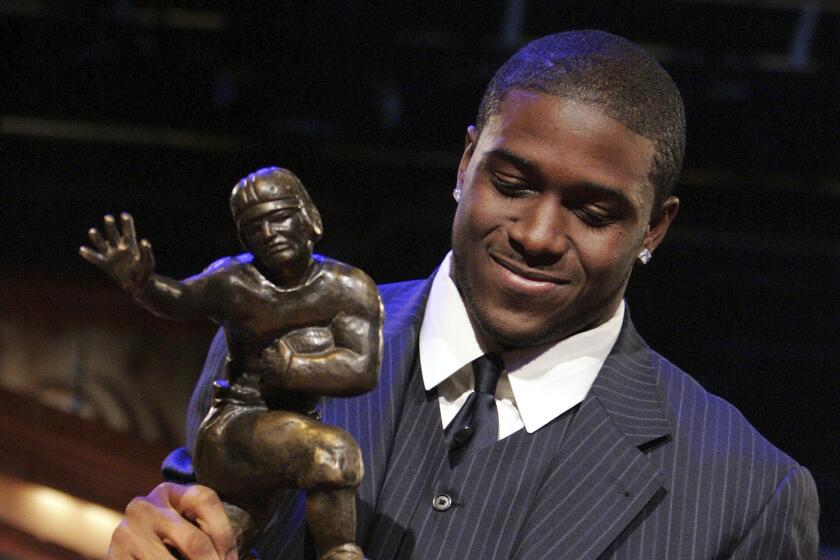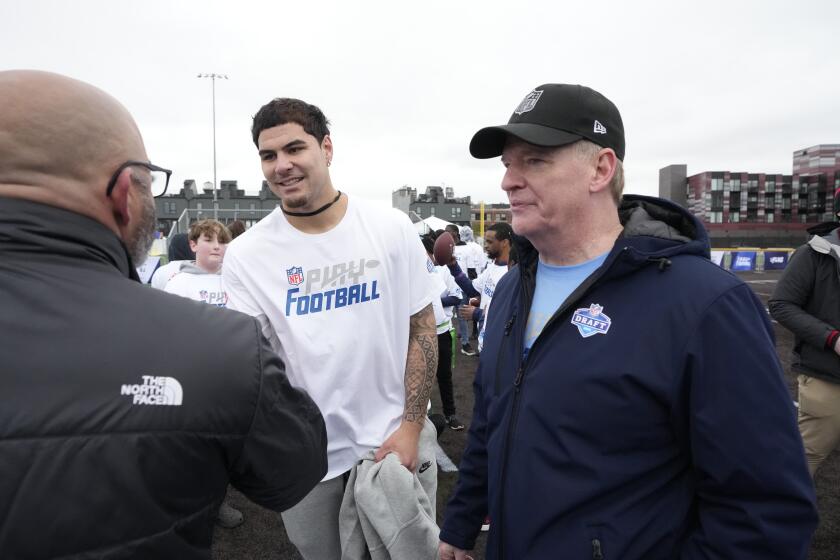Bruins ramping up the tempo, staying on their toes
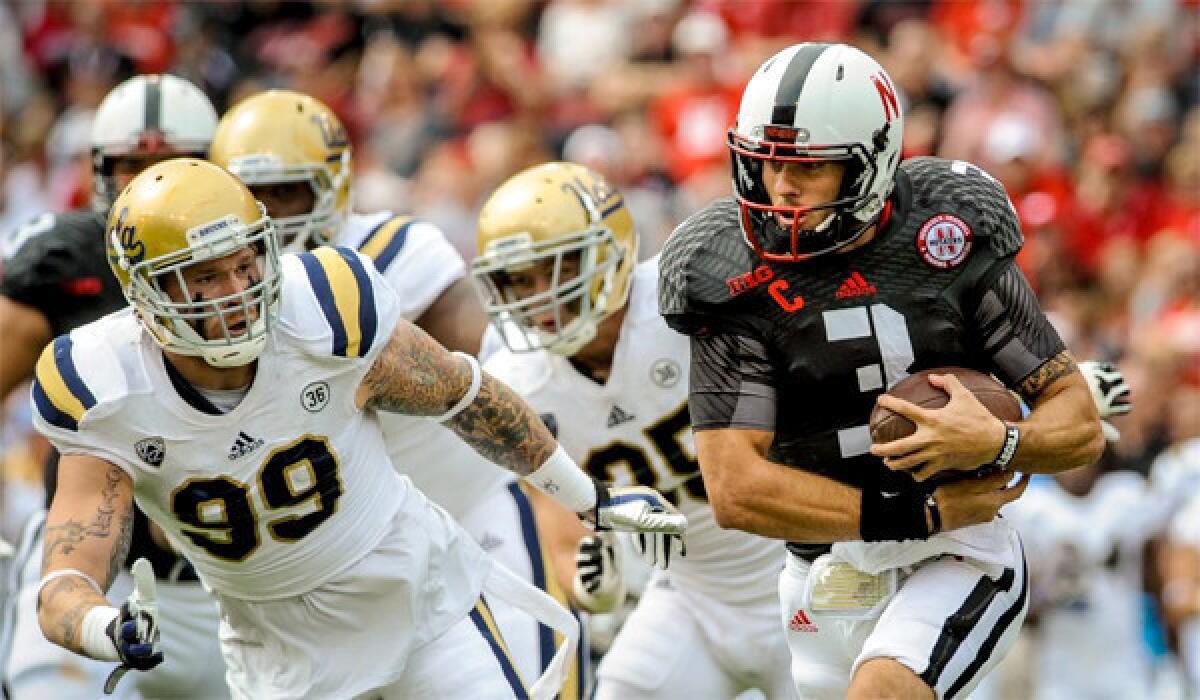
UCLA put pressure on two defenses Saturday: Nebraska’s and its own.
The Bruins scored four touchdowns in seven minutes, giving UCLA’s defense little time to rest.
Not that the players were complaining.
“We love that stuff,” linebacker Jordan Zumwalt said. “When we hold a team to a three-and-out and our offense scores right away, we’re not going, ‘Aw, shucks, we’ve got to go back on the field.’ It’s ‘let’s go do that again.’”
UCLA’s isn’t the only defense playing faster to keep pace.
All around college football, offenses are designed to create vapor trails. The Bruins, who had four scoring drives of 1 minute 49 seconds or less against Nebraska, are just one example.
The Pac-12 Conference in particular seems to roll faster with each new head coach. Sonny Dykes brought his squirrel derby offense to California this season. Arizona’s Rich Rodriguez was a pioneer of up-tempo offense at West Virginia. And Washington State’s Mike Leach has always had a little swashbuckle in his offense.
Rodriguez proudly points out that while he was at West Virginia, the school had some top-ranked teams defensively. “It’s not mutually exclusive. I think you can be good on both sides.”
In the West, Oregon is the blueprint.
The Ducks have had six offensive coordinators since 1999, each pouring a little more gas on the fire. On defense, Nick Aliotti has remained coordinator throughout, designing schemes to smother opposing offenses while also keeping the tempo Oregon’s offensive creates.
Stanford Coach David Shaw calls Aliotti “the most underrated guy in the conference.”
Oregon’s offense gets the headlines, but while the Ducks have averaged 47.5 points per game the last three seasons, they’ve given up only 21.7.
“Our offense, defense and special teams are all related,” said Mark Helfrich, Oregon’s first-year head coach.
The Ducks are a speed-based team in every facet, and the defense led the nation in turnover margin last season.
“We’ve tried to have more defensive guys in that linebacker mold,” Helfrich said.
UCLA is on that path. Freshman linebackers Myles Jack and Deon Hollins fit the profile. Placed in a drill covering wide receivers Wednesday, Jack intercepted two passes.
“You have to build everything around the tempo,” Arizona Coach Rodriguez said. “How you practice. How you train. How you approach your practice. How you approach everything.”
The Bruins have bought into it.
“You have to stay on your toes,” UCLA safety Anthony Jefferson said. “We know the offense moves at a rapid pace.”
Said defensive end Cassius Marsh: “We embrace the pace. We want to get the offense the ball.”
To do that requires manpower. The Bruins rotate players liberally, from the defensive front on back. “And it’s not like we’re saying, ‘Hey, you get this drive, and you get the next one,’” Mora said. “We’re running guys in and out all the time.”
The rigorous conditioning program that UCLA players endure pays off.
“You’re going to have 80 to 100 plays a week,” defensive coordinator Lou Spanos said. “You have to be in shape because it’s a long game.”
And, for the defense, getting longer.
UCLA’s defense has been on the field for 164 plays in two games. It played 134 through two games in 2011.
“Right now, people evaluate defenses on how many yards they give up,” said Dykes, the Cal coach. “That’s a relative figure. If you’re playing 40 snaps a game, you’re going to give up less than if you’re playing 70 to 80 snaps.”
So what would be the best way to judge a defense? It’s a good one, Dykes said, if it gives up “one less point than you score.”
UCLA has done better than that in its two wins, routing Nevada, 58-20, and Nebraska, 41-21, with lightly regarded New Mexico State next up Saturday at the Rose Bowl.
To linebacker Zumwalt, the key to UCLA’s continued success is clear.
“Everything has to be done at our offense’s tempo,” he said. “We don’t match that, we lose.”
Twitter: @cfosterlatimes
More to Read
Get our high school sports newsletter
Prep Rally is devoted to the SoCal high school sports experience, bringing you scores, stories and a behind-the-scenes look at what makes prep sports so popular.
You may occasionally receive promotional content from the Los Angeles Times.
